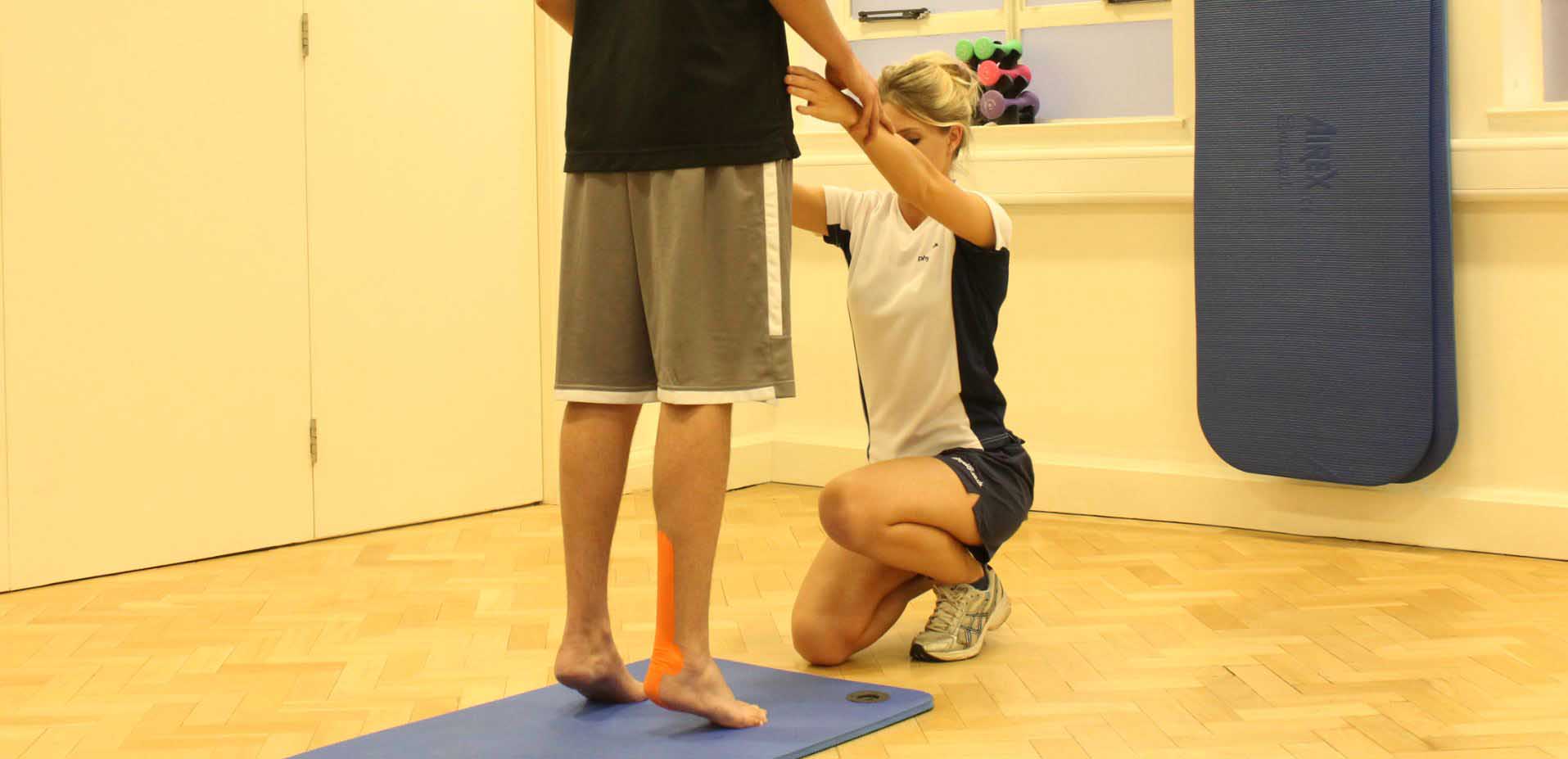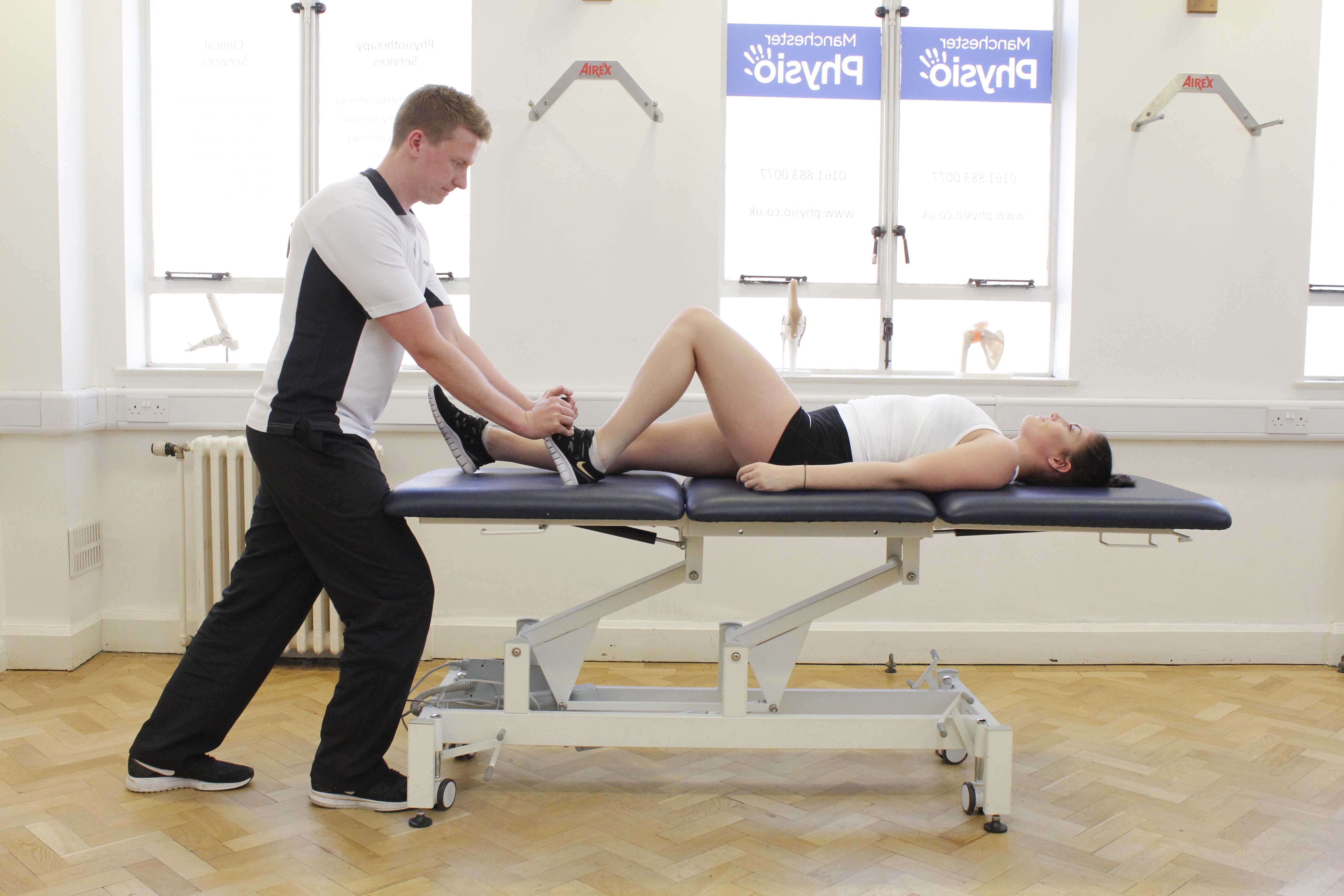What is an osteochondral fracture of the talar dome?
The talar dome is the upper part of the foot bone (talus) which joins with the leg bones and forms the lower half of the ankle joint. The dome is made of bone (osteo-) and is covered with a layer of cartilage (-chondral). Therefore, when a piece of this dome breaks off (fractures), it is referred to as an osteochondral fracture of the talar dome. Physiotherapy is a successful treatment for osteochondral fractures of the talor dome.
How does an osteochondral fracture of the talar dome happen?
Osteochondral fractures of the talar dome can occur when the foot and ankle are forcibly twisted or compressed. This mechanism commonly results in a sprained ankle but, in a few cases, it can also cause damage to the surface of the talus.
 Above: Supportive tape applied to ankle by experienced therapist
Above: Supportive tape applied to ankle by experienced therapistWhat are the symptoms of an osteochondral fracture of the talar dome?
Osteochondral fractures of the talar dome often occur at the same time as a sprained ankle. For this reason, the injury may initially be overlooked and treated as a sprained ankle. If this is the case, initial reductions in pain and improvements in range of movement and function will occur as the injured ligaments heal. However, if an osteochondral fracture is present, the ankle will continue to ache a number of weeks following injury. Pain, swelling and stiffness will increase as you gradually increase your levels of activity. You may also feel occasional catching or locking of the joint as the fractured portion of the talar dome blocks the movement.
Additional symptoms might include:
What should I do if I have an osteochondral fracture of the talar dome?
If you suspect that you have an osteochondral fracture of the talar dome, you should seek medical advice. You may arrange an assessment with your physiotherapist, who can refer you on to appropriate parties. You may also seek a medical opinion via the accident and emergency department.
What shouldn’t I do if I have an osteochondral fracture of the talar dome?
If you suspect that you have an osteochondral fracture of the talar dome, you should not ignore the problem. Continuing with painful activities could worsen your injury. If it hurts, stop and seek advice.
 Above: Passive stretch of the achilles tendon performed by specialist therapist
Above: Passive stretch of the achilles tendon performed by specialist therapistPhysiotherapy treatment for an osteochondral fracture of the talar dome.
Confirmation of the diagnosis of an osteochondral fracture of the talar dome will usually require scanning your ankle using a CT or MRI scan. If the diagnosis is confirmed, keyhole (arthroscopic) surgery may be required to remove any loose fragments within your ankle joint. Simple fractures (no loose fragments) may not require surgery. Either way, a period of non-weight-bearing (not putting any body weight through your ankle) in a cast will be required. The length of time that you spend in a cast and/or non-weightbearing will depend on the severity of the fracture and the opinion of the surgeon.
Physiotherapy is essential in the treatment of an osteochondral fracture of the talar dome. It can begin when you are able to begin weight-bearing, or when the cast is removed. Treatment may include:
Could there be any long-term effects from an osteochondral fracture of the talar dome?
Unfortunately, the recovery time of an osteochondral fracture of the talar dome is often months. In addition, a talar dome fracture can increase your likelihood of developing arthritis of the ankle later in later years.
To arrange a physiotherapy assessment call Physio.co.uk on 0330 088 7800 or book online.

 0330 088 7800
0330 088 7800





































